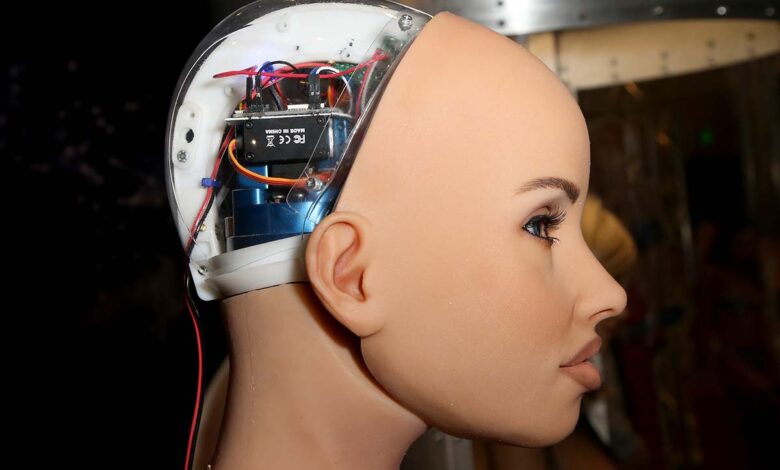Is Having Sex With Robots Actually a Bad Thing?

You’d be hard-pressed to find someone who’s publicly pumped about the rise of “sexbots.” Westworld, Ex Machina and Her have trained us well — under no circumstances should intimacy and technology mix.
But our sex wants and needs have veered more digitized for years now, perhaps more than we’d care to admit. Four of the most trafficked websites in the world are pornographic; OnlyFans has revolutionized sex work; VR (and the imminent rise of the metaverse) will continue to turn the traditional bedroom experience on its head.
And the truth is, it might be time for us to ground our preconceived notions on sex robots in reality (that’s to say, collaborative academic research), as opposed to big-budget psychological thrillers.
A recent feature in Freethink examines this topic at length, arguing that as the technology is already here, we’re better off coming to terms with it and searching for positive ways it could influence society, instead of anticipating perils and shouting moralisms.
That technology is predominantly being manufactured out in Las Vegas, at a robotics warehouse called Abyss Creations. The company’s been featured for years now in various publications — The New York Times, Vanity Fair, Rolling Stone — but only recently, following “leaps in functionality,” have its robots presented as this … real.
RealDollX sexbots, which can you see for yourself here, start at around $5,000, but push past $10,000 depending on how many add-ons a customer selects. There is a selection of pre-configured dolls, though the site also has a customization feature, where interested parties can select everything from the face, to body type, to vaginal insert.
At the moment, Abyss sells about four a month. Each robot is made-to-order, in the United States. If you’re imagining a modern take on the blow-up doll, a sort of life-sized rubber frame with a Fleshlight attached to it, think again. These dolls are extremely (spookily, depending on who you talk to) advanced. Bluetooth technology tells the doll when it’s being penetrated, and it’ll move and moan towards its own orgasm.
But the dolls go beyond physical intimacy — they’re programmed to express emotional attachment too. This is AI, after all. They can recite sonnets. They remember what day of the week you like to eat sushi. One customer Freethink got in contact with, who’s in his mid-sixties and has three different robots, likes to chat with them at the end of the day. “I sit, and have a Stella, and just talk with them,” he said.
Obviously concerns abound. But Abyss (and other leaders in sex robotics) believe they’re covering themselves well. Fears about violence towards the dolls? That’s the one thing they’re programmed not to respond to; as the CEO says, “There’s no reason to do that. They won’t react to violence.” How about data protection and privacy? Experts say keeping information safe is a business incentive for people in this industry, so they maintain best practices. No Facebook integrations here. And worries that sex dolls could displace sex workers?
A Berlin-based “cyber brothel,” the first of its kind, might’ve already figured out a workaround for that. At Cybrothel, customers pay by the hour to get physically intimate with a sexbot, while a trained sex worker provides a voiceover from an off-site location. Other sex workers have expressed a willingness to work in the same room as a sexbot, assuming that’s what a client is interested in.
All that said, though, how might a $7,000 sexbot impact a relationship between two partnered human beings? Couples often recruit sex toys to “spice things up,” but surely a cyborg is taking it too far, no?
That will be up to each individual couple to decide. It’s unlikely, considering the rate at which Abyss Creations is making these things, that society will be flooded with sexbots anytime soon. Introducing one into a relationship will be a heady, delicate decision, like inviting a friend for a threesome or exploring polyamory.
The real opportunity, as some in the field see it, is to assess the benefit sexbots could have through therapeutic means. How might these toys be used as tools, to bring company (not just pleasure!) to those feeling alone or those growing old? As of now, research is limited. That’s because sex tech research has barely scratched the surface. As one tech industry veteran said to Freethink: “Academics are keeping their eyes closed.”
It’s understandable — AI has massive implications in just about every single field. Why focus on the weirdos who want to sleep with robots? But never forget: sex sells. These robots will have staying power, whether society likes it or not. If we take time to study the technology that isn’t going anywhere, we can pinpoint the best it has to offer. We can also learn a bit more about robots along the way, which, you know, could make sure they don’t take over the planet someday.
Thanks for reading InsideHook. Sign up for our daily newsletter and be in the know.
You can read the full article from the source HERE.
-
Sale!

Aurora: Tender Sex Doll
Original price was: $2,799.00.$2,599.00Current price is: $2,599.00. Buy Now -
Sale!

Dominique: Thick Sex Doll
Original price was: $2,499.00.$2,199.00Current price is: $2,199.00. Buy Now -
Sale!

Auburn: Red Head Sex Doll
Original price was: $2,199.00.$1,899.00Current price is: $1,899.00. Buy Now






